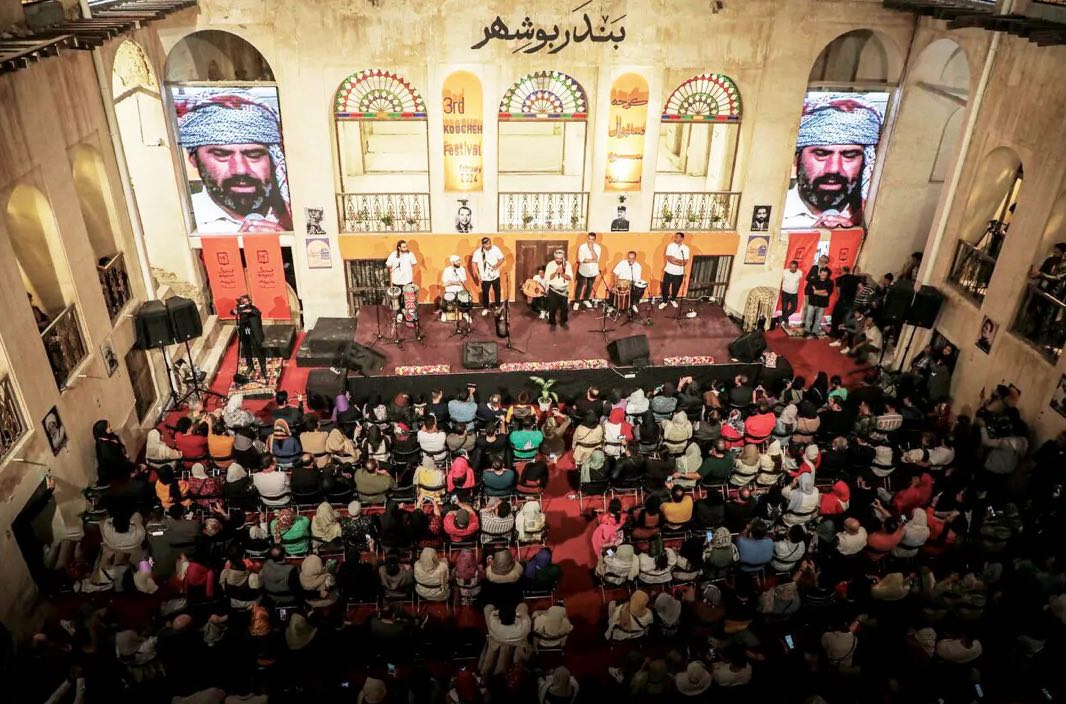Joyful music and celebration in the alley
Joyful music and celebration in the alley
An alley in the heart of the old fabric of Bushehr today is not just a passage and route
In Bushehr today, the name of an alley alone carries cultural and social weight and contemplation. An alley that with a few wooden trunks for sitting, a sharbat shop at its corner to quench thirst, and the Haj Rais boutique hotel opposite it to view Bushehr’s architecture, and an always-on fan on its ceiling trying to be the killer of heat, has become a brand that today can fluctuate hotel rates, accommodation, and airplane tickets.
An alley that alone has managed to help rebrand a city, reaching its fourth festival. A festival that started in 2017 with a focus on Iranian folk music and the customs and traditions of the people of Bushehr and by opening Bushehr’s doors to guests, has boosted tourism in this historic port.
In subsequent years, not only did the festival expand abroad, but international figures from other countries also came to Bushehr to perform.
After the third festival, a private sector in the UAE invited the executive team of the Koocheh Koocheh Culture festival to Dubai, although before Dubai, due to cultural connections between Bushehr, India, and the Gulf countries, this event was also held in Mumbai and Doha by Bushehri boys.
Such a branding process cannot be extracted from government and organizational management and directives.
A wide range of elements in Bushehr’s cultural and social history came together to create such an event.
The newborn of these days in Bushehr is a child that all of Iran desires and lines up to see.
If its demand was not high, airlines and hotels would not pre-sell for it, and free trade zones like Kish and Chabahar would not organize similar festivals like Island and Port with the same Bushehri team to attract tourism.
Today, instead of appreciating the creative organizers of a city for such ingenuity, the organizers fear that the start of this year’s festival may meet the sad end of last year’s closure and the festival may not see its fourth year.
This event is registered in the country’s cultural heritage and tourism calendar, and its legal permits have been obtained, and it is supposed to be carried out according to the current laws of the country, but today some issues have created challenges for holding this festival.
It is heard that in one of the mosques of this city, a group opposed to its execution has started writing petitions and collecting signatures from worshippers, and a certain social activist has condemned this event, saying that people should protect their religion and culture during the festival days.
If officials grant the permission to hold it, the people themselves can confront the artists of this festival with stoning against debauchery, vulgarity, and licentiousness.
Today, the text of the responsible authority and the custodian of the law is clear, and one cannot easily and simply violate the country’s laws by misusing the name of the people and Islam.
In my opinion, such behaviors, like someone issuing a statement for stoning against the artists of this festival, are a clear example of expressing and inviting collective violence, which can be examined by the prosecutor’s office.
When the music of this event is focused on folk or local styles that have been intertwined with the daily life moments of the people along the sea, deserts, and alleys of this historic port for years, how can it be considered vulgar and licentious? The alley alone has managed to help restore the historic fabric and, by creating cafes and accommodations, narrate people’s stories in various music formats like Khayyam singing and Ney Meh singing, to not only create economic prosperity but also keep the spirit of life alive in the alleys of Bushehr.
The options that have flourished around this cultural event alone have managed to overcome the shortcomings of several government institutions responsible for culture and entrepreneurship.
Ignoring all these virtues and being ill-tempered with artists is the pinnacle of backwardness and surrender.
If cultural custodians and statesmen are not going to protect the heritage of their people from past decades, what are they supposed to guard?
If today we silence the sound of Iranian folk music, we should expect the viral spread of vulgar music by the likes of Sasi among the new generation, which we are witnessing.
And it is not unlikely that if the space for holding such a festival is restricted, we may witness its permanent migration abroad.
In my view, even the migration of the alley from Bushehr will not lead to the elimination of this valuable brand.
I believe because the alley is intertwined with the art and culture of a land that has its heir, and because the people are its heirs, there is no dead end in it, but not holding it in the territorial coordinates that belong to itself is a bad loss for Iran and Bushehr.

